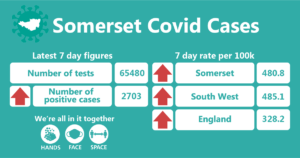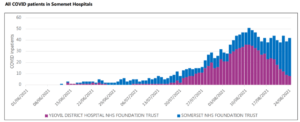Welcome to the latest edition of the weekly Somerset Covid-19 update for key stakeholders. This update is produced on behalf of the Somerset Covid-19 Engagement Board and is designed to provide a weekly update on the current Covid-19 situation in Somerset.
As you will no doubt have seen in the local and national media our Covid-19 cases are rising rapidly, and, for the first time, the rates here in the South-West are higher than the national average. Currently, Sedgemoor has one of the highest rates of infection in the country which is bringing a considerable amount of press attention. Around two thirds of the cases are in young people (15-34). Most of the people in these groups will have had one vaccination, but under 18s and some older people will be unvaccinated. Within Sedgemoor, the Bridgwater area is notably higher than surrounding rural areas, this may be because it does have a relatively young population compared to the rest of the county and more people in higher contact occupations (hospitality, tourism, security and retail).
We know from contact-tracing and other intelligence that Covid-19 transmission is occurring through social contact in indoor locations such as entertainment and hospitality premises and other enclosed spaces such as cars – for example when car sharing. We are sharing reminders about how to best reduce the risk of transmission on our social media pages and would be grateful if you could please share these posts with your networks to help us reinforce these very important messages. Further information can be found later in this update.
Locally, and linked to the rising case rate, we have seen a small but increasing number of people requiring hospital care, and this is not only when they are first ill with the virus, but also a result of long Covid. We really must all play our part to help bring our rates back down and break the chains of transmission in our county. Our NHS colleagues have reported people who have tested positive for Covid-19 turning up at hospital, for example, because they are concerned about their children appearing to develop symptoms of the virus. Please do not do this. Instead call 111 with any concerns you have and staff there will help you.
We know significant numbers of people who have holidayed on the Somerset coast in recent weeks have subsequently tested positive for Covid-19, most of whom are not of course Somerset residents. It is likely some tourists do arrive incubating Covid-19, and other tourists are contracting the virus while here on holiday. Ahead of the bank holiday weekend, we are encouraging visitors and residents alike to keep up all important safety measures; wearing a mask in enclosed spaces, distancing where possible/or meeting outside, washing hands/using hand sanitiser, ventilating inside spaces and testing regularly. We also continue to work with our District Council colleagues to engage with businesses in their areas to check on
Latest Covid Dashboard: The following link below will take you to our website: Coronavirus (COVID-19) (somerset.gov.uk) Then scroll down the page until you get to ‘COVID-19 Dashboard’ in the list. Click on this and the dashboard will open.
‘Remember, everyone can catch it, anyone can spread it’.



| David Fothergill, Leader of Somerset County Council Twitter: @DJAFothergill | Trudi Grant, Director of Public Health Twitter: @SomersetDPH | Clare Paul, Cabinet Member for Public Health and Wellbeing Twitter: @Clarepaul_ |

In the week up to 21 August approximately 65480 tests were carried out across the county with 2703 new confirmed cases. The rates have increased to 480.8 per 100,000. South-West rates are the highest in the country and Somerset is just below the regional South-West rate, but higher than the national rate. Somerset hospitals remain very busy and have a number of inpatients with Covid-19 in their care. The hospitals are requesting that patients who test positive for Covid-19 in the community phone 111 before attending the hospital, to ensure the NHS can deliver care safely and prevent transmission where possible.

This Weeks Headlines
The main items featured in this weeks update are:
- Workplace, care and school settings
- Summer Campaign
- Vaccination update
- Testing Update
- Socialising
- Resources and further information
Workplaces: The ‘Working Safely’ guidance provides advice on sensible precautions employers can take to manage risk and support their staff and customers. To find out more information, visit the GOV.uk website.
Businesses still have a legal duty to manage risks to those affected by their business and to their employees. The way to do this is to carry out a health and safety risk assessment, including the risk of Covid-19, and to take reasonable steps to mitigate the risks you identify. You should use the guidance to consider the risk within your premises and decide which mitigations are appropriate to adopt.
For business continuity it is still an important control factor to identify the close contacts of cases that have been in the workplace setting, often by speaking to the case. Remember to ask about who they were with at break times and whether they car share. This exercise can help reduce the risk of onward transmission within the workplace.
A contact is a person who has been close to someone who has tested positive for Covid-19. You can be a contact any time from two days before the person who tested positive developed their symptoms (or, if they did not have any symptoms, from two days before the date their positive test was taken), and up to 10 days after, as this is when they can pass the infection on to others. A risk assessment may be undertaken to determine this, but a contact can be anyone who has had any of the following types of contact with someone who has tested positive for Covid-19:
- face-to-face contact including being coughed on or having a face-to-face conversation within one metre
- been within one metre for one minute or longer without face-to-face contact
- been within two metres of someone for more than 15 minutes (either as a one-off contact, or added up together over one day)
A person may also be a close contact if they have travelled in the same vehicle as a person who has tested positive for Covid-19.
Cases of Covid-19 still need to isolate for 10 days, but from 16 August 2021 if you are a close contact of a case and are fully vaccinated against covid-19 or younger than 18 years and 6 months you do not have to self isolate. For more information, visit the GOV.uk website.
Businesses are also being encouraged to download and display materials from our summer campaign.
Care Sector: We have seen an increase in cases of Covid-19 in social care settings and for the week ending 21 August have had 108 cases in 72 settings.
Care home workers and volunteers – mandatory vaccinations
It will be mandatory for care home workers and volunteers to have both Covid 19 vaccinations by 11 November 2021 unless they are exempt. This means that 16 September 2021 is the last date for care home workers to get their first dose to be fully vaccinated when regulations come into force. For guidance view the GOV.uk website.
Latest testing guidelines
Coronavirus (COVID-19) testing in adult care homes
Coronavirus (COVID-19) testing for adult day care centre workers and service users
Coronavirus (COVID-19) testing for homecare workers
Testing service for extra care and supported living settings
More information
For information related to Covid 19 for adult care providers please visit Somerset Safeguarding Adults Board where you will information on reporting cases of Covid 19, support helplines, webinars and links to guidance.
Schools and Early Years settings: Due to the summer holidays we are seeing very little transmission within secondary schools and age 16+ settings, as they are closed. In the week ending 21 August there were 32 cases at 24 nursery settings who remain open year-round.
The government launched its back to school and college campaign to set out the experience that students can ‘get back to’ from September, with restrictions such as bubbles eased to allow a full return to sport, music, drama, science experiments and being with their friends.
Schools and colleges are maintaining proportionate protective measures such as testing, ventilation and extra hygiene precautions that help keep children and staff safe and minimise disruption to face-to-face education.
Secondary schools and colleges are offering two tests on-site at the start of term, followed by continued regular testing at home. For more information, visit the GOV.uk website.
Somerset County Council are busy preparing for schools return and next week will be running workshops for school leaders regarding new processes nationally and locally to support children back into education. Resources will be published on the SSE website as they become available.
Summer campaign: Last week we launched Phase 2 of our Summer Safety campaign encouraging residents and visitors to commit to keeping our county safe this summer.
Following the easing of many Covid-19 restrictions, people are returning to a more normal way of life However, coronavirus is still very much in circulation and as we highlighted in our introduction, our numbers are rising. The latest phase of the campaign, which is in partnership with Visit Somerset and Visit Exmoor, has launched via the Somerset County Council website.
The webpage allows local business and community settings to download or request to be posted, promotional material which can be displayed in their settings to help promote and show support for the campaign. We’ve already had a great uptake for these materials from hospitality settings, shops, banks and many other businesses across the county, and in particular Sedgemoor.
Please look out for LinkedIn posts (also available to download from the campaign site), encouraging download of ready-made resources for businesses.
Coronavirus isn’t taking a holiday. Demonstrate your commitment to keeping our county safe by downloading copies of the ‘Stay safe’ posters and postcards to display within your venues via the Somerset County Council website. As well as the guidance and advice on how to stay safe and what to do if you have an outbreak of Covid-19 in your organisation.
Vaccination Update:
For the latest information about the Somerset vaccination programme go to the NHS website.
16 and 17 year olds are now able to go online to book their vaccinations. Go to the NHS website to find out more about where the local ‘Grab a Jab’ clinics are taking place this week.
The Department of Health and Social Care (DHSC) has produced a toolkit to encourage COVID-19 vaccine uptake for young people and promote the benefits of the vaccine. Resources including video, social, digital display and radio are all available to download now.
Do you have, or know someone who has concerns over receiving the Covid-19 Vaccine? We have a team of trained Vaccination buddies who are here to help! The programme enables people to be offered support via a ‘buddy’ who can help them to make informed decisions about having the Covid-19 vaccination.
People can be referred (or self-refer) to the scheme and a Vaccination Buddy will contact them by phone to discuss their concerns and offer information and reassurance. Vaccination Buddies come from all walks of life and have the necessary skills and knowledge to support people in a friendly, non-judgemental way.
There is also have an excellent video introducing one of our Vaccination Buddies which can be viewed on YouTube.
Testing: For people who do not have symptoms of Covid-19, it remains very important to participate in twice weekly asymptomatic testing if you are out and about and meeting up with people. Please make sure that you take a test before you travel anywhere and if it is positive, stay at home and arrange a PCR test. If you would like more information about lateral flow testing, please go to the Somerset County Council website.
You can call 119 or visit the GOV.uk website to order lateral flow tests online to be delivered to your home. You can also collect a kit at a local pharmacy. For the time being, while pharmacies use up existing stock, you may still be given one of the old Innova test kits. Please remember to report your LFT result via the GOV.uk website.
If you have symptoms of Covid-19 it is important that you take a PCR test, which can be done by phoning 119 or ordering a test via the GOV.uk website.
The government has announced a new UK wide antibody surveillance programme which aims to improve our understanding of immunity against Covid from vaccination and infection. It may also provide insight into groups who do not develop any immune response. Up to 8,000 antibody tests kits will be available each day to people who test positive via a PCR test. If you’re aged 18 and over, you can opt into this scheme when booking your PCR and then a random selection of people who test positive will be sent two finger prick antibody tests to complete at home and send to the laboratory for testing. Anyone taking part in this study must take their first antibody test as soon as possible after receiving a positive PCR result, before the body has had time to generate a detectable antibody response to the current infection. The second test should be taken 28 days after testing positive and will measure antibodies generated in response to the infection. The comparison of these two results will help identify how well vaccinated individuals boost their immunity when they are infected, and how this might vary with different variants of Covid. If you are interested in reading the Government’s press release about this, go to the GOV.uk website.
Socialising: In this week’s Covid Catch Up, Clinton Rogers discusses how we are all living with Covid-19 now most restrictions have been lifted, including how this may have led to the recent increase in cases – with the Sedgemoor area having the highest national figures last week.
Clinton also talks to Trudi to discuss why we all still need to be careful and follow some simple guidance for meeting up more safely. You can watch the film on YouTube.
As we mentioned last week, we have identified significant numbers of cases linked to nightclubs. It is vitally important to keep doing two lateral flow tests each week (see above for more details) and if the result is positive, to stay home and not mix with others.
While currently there are no restrictions, it is strongly recommend caution while in crowded areas. Nationally there are plans in place to require night-clubs to ask for proof of double vaccination prior to entry, and the plan is that this is in place by the end of September. Read the BBC news article for more information.
Please look out for Somerset County Council’s social media posts over the bank holiday weekend and share them with your followers to help us reinforce the message that mixing with others carefully is how we can help ourselves and each other.
Resources and further information: Please do keep an eye our Healthy Somerset website, which has a huge amount of information and resources to help keep everyone healthy happy and safe at this time.
For the latest local information as well as digital resources, posters and flyers please visit the Somerset County Council website.
The Somerset Local Outbreak Management Plan outlines how we, the council, will work with the NHS Test and Trace Service, PHE, the NHS and other partners to ensure a whole system approach to preventing and managing local outbreaks. This can be found here.
Finally, please like them on Facebook, follow them on Twitter and share their posts with your networks to help them in communicating these important messages. Follow their Director of Public Health Twitter account too.

